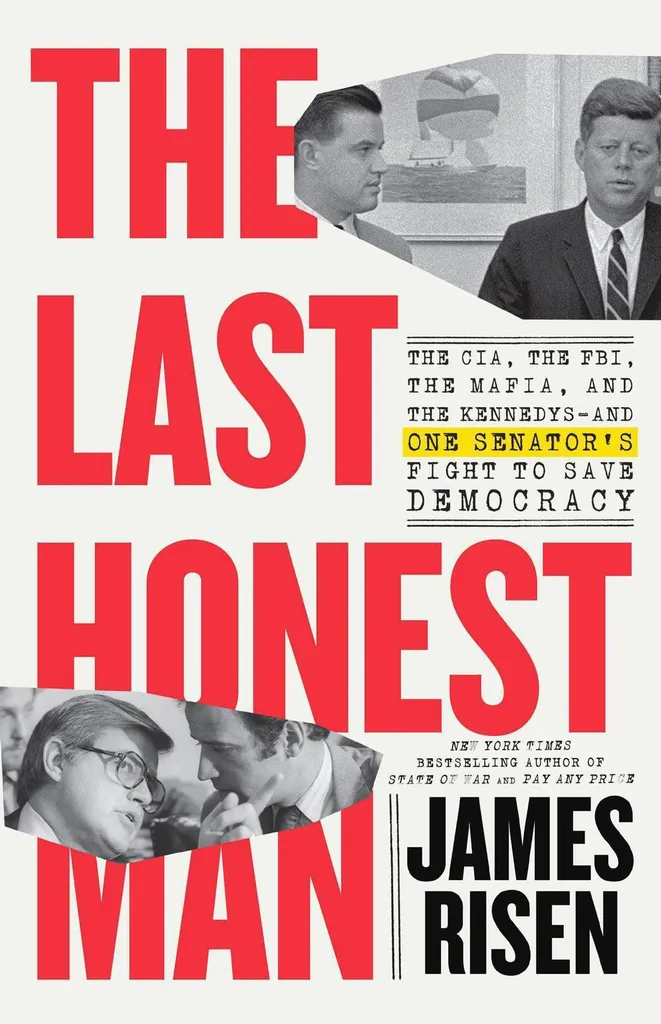- June 09, 2023
- By Chris Carroll
Teaming up with Vegas mobsters to assassinate foreign leaders or getting unwitting people (and dogs) really, really high in mind control experiments sound like TV-ready hijinks, but when these and darker plots were being carried out by secretive, unaccountable government agencies, they may have posed an insidious threat to our system of government.
That belief animated U.S. Sen. Frank Church (D-Idaho), the subject of a new book, “The Last Honest Man: The CIA, the FBI, the Mafia, and the Kennedys— and One Senator's Fight to Save Democracy," by Pulitzer Prize-winning journalist James Risen, a visiting professor of journalism, with his son, Thomas Risen. It debuted last month on The New York Times’ best sellers list.

Church in 1975 convened what’s come to be known as the Church Committee. In its public Senate hearings and a final report issued the following year, it exposed decades of lawbreaking, abuse and dubious surveillance by intelligence agencies including the CIA, FBI and then-mostly unknown National Security Agency (NSA).
“The Church Committee is an incredibly important part of American history and continues to have an impact,” Risen said, a former New York Times reporter who’s now the senior national security correspondent at The Intercept. “And it’s really entered the political lexicon—there’s always talk about a ‘new Church committee’ to investigate wrongdoing.”
Risen himself has played a significant role in uncovering the increasing reach of intel agencies, including the existence of “Stellar Wind” and other domestic spying programs in the wake of the Sept. 11, 2001, attacks, resulting in a 2006 Pulitzer Prize for National Reporting. He spoke to Maryland Today about why Church’s disgust with U.S. intelligence abuses remains relevant decades later.
Who was Frank Church?
I titled the book “The Last Honest Man,” and in a lot of ways, he really was. He was a very complicated figure, but at heart he had a basic integrity and honesty. He had flaws. He was widely seen by other senators as kind of pretentious, kind of a publicity hound. He had a very precise, old-fashioned way of speaking he developed when he was a teenager in Boise, Idaho, so he sounded like a politician from the 1920s or thirties. These mannerisms and the way he loved attention perhaps convinced some people he wasn’t serious in his investigations of the CIA and FBI. They were wrong.
Where did he get his zeal for reforming the intelligence community?
He became a real believer that the United States was becoming a militaristic empire that had to be reined in. He started as a real Cold Warrior, but the Vietnam War radicalized him; he came to believe that the power of the intelligence community as well as the power of other parts of the U.S. establishment, including multinational corporations and the military, were leading us to a period of endless war that would make the United States less of a democracy. Those beliefs resonate today, in the years since 9/11 and the endless wars in Iraq and Afghanistan.
Is there an anecdote that sums up Church?
In his first Senate race in 1956, he was running against an incumbent named Herman Welker, one of the closest allies of Sen. Joseph McCarthy, who started the communist witch hunts of the 1950s. Welker had been involved in a blackmail plot against another senator who opposed McCarthy—Welker had learned the senator’s son was homosexual, and threatened to expose him in his home state of Wyoming. That senator committed suicide, and two years later, Church’s campaign staff wanted to publicize this in a damning pamphlet compiled without his knowledge. When he found out, he had them burn all of them. He said, “That’s not how I want to win. I want to win on the issues,” which he did. I don’t think there are many senators who would have done that.
The book recounts some of the weirder CIA operations Church uncovered—like Bing Crosby trying to help blackmail Indonesia’s president with a bogus porn film. What stands out for you?
The CIA created an alliance with the mafia to try and kill Fidel Castro. It devolved into a crazy Keystone cops operation. Sam Giancana—who was the head of the Chicago mob at the time—was in Miami with all these other mafia leaders working on how to kill Castro. But he decided he had to go to Vegas, where he was worried his girlfriend was sleeping with a standup comedian. To stop him, the CIA arranged a wiretap so he could keep tabs on her from Miami. That was a thread J. Edgar Hoover and the FBI pulled on to uncover the whole CIA-mafia alliance, and ultimately uncover the fact Giancana and John F. Kennedy were sleeping with the same woman.
What did you learn that disturbed you?
The CIA wanted the Chilean military to stage a coup against Salvador Allende, the democratically elected socialist president of Chile. But the chief of staff of the Chilean army refused; he wanted to support the constitution of Chile and the rule of law. So the CIA worked with a bunch of lowlifes in Chile to try to kidnap him. And in one of the kidnap attempts, he was killed. I always thought that was a really despicable action by the United States.
Does the advancing technology of intel gathering make it easier or harder to keep track of the agencies now?
It’s become much more difficult for congressional oversight to control everything that the intelligence agencies do. Their power has dramatically expanded since the Church Committee days, and I think it’s time for them to be reined in again.
Topics
Research